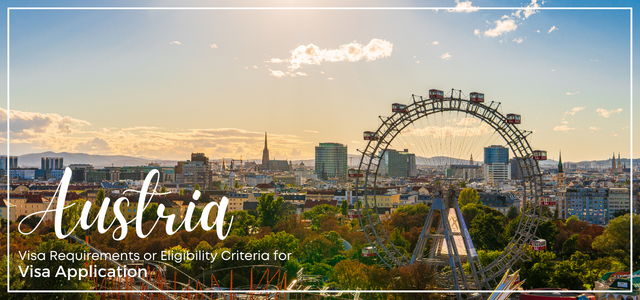Austria Visa Application Procedure
Austria is a nation in the ancient continent of
Europe with a land area of 83,871 square kilometers. According to GDP per
capita, it is one of the wealthiest nations in the world and has one of the
strongest economies in the European Union. The work visa does not allow workers
to stay in Austria. So the work permit, salary statement, and recommendation
letter from the company are necessary to temporarily stay in the country. If
someone legally lives for at least five years, they can apply for permanent
residence.
The country of Austria provides it all! Tourist
Visa, Business Visa, Study Visa, Work Visa, Sports Visa, and Visit Visas to
everyone willing to visit the country in the upcoming days of the future. To
acquire these, firstly you need to be an intended traveler and should have the
capability of bearing your expenses when in a new country. Good health is
important!
A passport is an extremely important travel
document to fly to Austria. Please remember that your passport should be legal
for a minimum of 6 months from your intended stay in Austria. A minimum of 2
blank pages should be available in the passport for stamping. The passport
should not be torn or damaged in any way. Intending to cross an international boundary
will be considered to be an offensive crime so all should follow the rules and
regulations of a country before going to visit.
An old passport is also very important to
showcase to the authorities of Austria because it represents your travel record.
So, in case you are having an old passport, submission is a must in proper
condition.
In case you have it, you compulsorily need to
showcase it because without it you do not get a visa stamp.
What is the Visa Strategy and Visa Policy of
Austria?
Currently, around 90 nations are allowed to
enter without a visa for short stays, like for the purposes of tourism,
business, transit, and medical treatment. However, this might change in the
future.
Nonetheless, there are 150 other nations that
are needed to apply for a Schengen visa to gain entry to Austria for tourism
purposes. Eligible individuals are ordered to acquire this travel document in
advance of their travel dates.
Eligibility criteria for Austrian Visa
The visitors need to carry their identity cards
if they are not EU citizens at the Austrian ports. The Austria visa requires
a current passport and valid visa these documents. After verifying the
documents minutely the Austrian border guard allows you to enter. The border
guard will go through your papers and could inquire about your travel to
Austria. If the authorities do not find any objection, you can come to the
country and later on to the Schengen zone. When entering the Schengen region,
kindly make sure the Austrian border official stamps your passport. Before
leaving the country you need to mention it in the passport.
Documents required
The passport you carry needs to fulfill the
criteria like at least six-month validity, two blank pages and been issued in
the last ten years.
Correctly fill up the visa application form.
The Schengen visa photo required recent photos
which were established by ICAO. White background should be visible. The face
should cover around 80% of the entire frame. Glasses, headgear and teeth should
not appear.
To apply for a visa, you must pay a particular
fee.
The cost varies by visa type.
You must bring a cover letter, in which you
should specify your visit's purpose.
The dates of your flights and travel
arrangements must be accurate.
You must have travel insurance for the Schengen
region that covers any medical emergencies and problems up to 30,000 euros.
Birth certificates or marriage certificates are
examples of civil status documents that need to be submitted.
You must present your hotel reservation or other
documentation showing the accommodations you have booked.
Round Tickets would be encouraged.
You must show evidence that you have the
resources necessary to pay for your Austrian travels.
Copies of your prior Schengen visa must be
submitted. Only if you have already held a Schengen visa is this applicable to
you.
Processing time
An Austria visa processing time typically
takes up to 15 business days. But often it might take up to 30 or 60 days.
Payments
Cash or Visa or Mastercard or Rupay can be used
to pay all VISA fees and service charges.
Top tourist attractions in Austria
The Vienna Hofburg Palace
In the ruling period of the Habsburg family, the
grand Hofburg Palace was the residence for centuries in Vienna. The entire
Hofburg complex, which includes its many lovely squares and gardens, spans 59
acres and has 2,600 rooms spread across 19 courtyards.
Salzburg Altstadt
Since the beginning of Christianity in Europe,
Salzburg has served as the home of Prince Archbishops. The stunning cemetery
and its catacombs, St. Peter's Abbey and its cathedral, and the location where
The Sound of Music was filmed attract tourists. Additionally, UNESCO has
designated it a World Heritage Site.
Belvedere Palace
The magnificent Belvedere Palace is one of
Austria's most popular palaces and should unquestionably be on your vacation
agenda for Vienna. You may visit one of the nation's best-preserved
architectural treasures as well as the majority of the attraction's remarkable
collection of artworks here. Other prominent features include Carlone Hall's
ceiling fresco, the two-story Marble Hall's numerous sculptures, and paintings,
and the spectacular Ceremonial Staircase.
Krimmler Ache
A terrific day excursion is the Krimmler Ache,
which rises in the neighboring village of Krimml and plunges 380 meters in
three breathtaking cascades. If you want to hike, Krimml, which is high above
the Salzachtal in a wooded valley and situated at a height of 1,076 meters, is
a perfect place to stop for a few days.
Eisriesenwelt
The impressive World of the Ice Giants, the
world's biggest system of ice caverns, is located on the western side of the
Tennengebirge. You'll come face to face with the enormous Hymir Hall and its
spectacular ice formations and icicles after meandering around the Great Ice
Wall.
The Styrian Armoury
The edifice, constructed in 1644, is home to an
amazing collection of armor and weapons from the 17th century that are in
excellent condition. This collection is sufficient to arm 32,000 soldiers,
including helmets and weapons. A Renaissance fountain and three-story pergolas
line one side of the magnificent arcaded courtyard, while the Knights' Hall
boasts an exquisite plaster ceiling from 1746.











